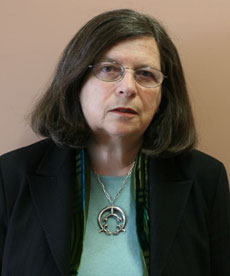|
|
- Lecture
- Related Materials

Ms. Vera Gowlland-Debbas
Professor of Public
International Law
Graduate Institute of International and Development Studies (IHEID), Geneva
Biography  |
Peace and Security
Security Council
The Relationship between
the Security Council and
the International Criminal Court
The lecture, which pre-dates the 2010 Kampala Review Conference, focuses on the outreach of the Security Council in the area of individual criminal responsibility, more particularly on its relationship with the International Criminal Court. This linkage between criminal justice and the restoration and maintenance of international peace and security, which is sustained both by the Statute of the ICC and the practice of the Security Council, cannot be seen in isolation. It raises important systemic issues for it must be analyzed within the context of an emerging ordre public of the international community, as well in the light of the classical debate over the legal/political dichotomy in international society and the separation of political from judicial organ. The interlocking of collective security mechanisms with the hybrid process of institutionalization of international criminal responsibility underlines the problem of developing international law through a process that includes the ad hoc and piecemeal reactions of a political organ to particular crises.
|
Peace and Security
Security Council
The Relationship between the Security Council and the International Criminal Court
A. Legal Instruments
Charter of the United Nations and Statute of the International Court of Justice, San Francisco, 26 June 1945.
Statute of the International Criminal Tribunal for the Former Yugoslavia, Report of the Secretary-General pursuant to paragraph 2 of Security Council resolution 808 (1993) (S/25704), 3 May 1993.
Statute of the International Criminal Tribunal for Rwanda, Security Council resolution 955 (1994) of 8 November 1994.
International Law Commission, Draft Statute for an International Criminal Court, 1994.
Rome Statute of the International Criminal Court, Rome, 17 July 1998, United Nations, Treaty Series, vol. 2187, p. 3.
Statute of the Special Court for Sierra Leone, Freetown, 16 January 2002.
Negotiated Relationship Agreement between the International Criminal Court and the United Nations, 10 April 2004.
B. Jurisprudence
International Court of Justice , United States Diplomatic and Consular Staff in Tehran (United States of America v. Iran), Judgment of 24 May 1980, I.C.J. Reports 1980, p. 3.
International Court of Justice, Military and Paramilitary Activities in and against Nicaragua (Nicaragua v. United States of America), Merits, Judgment of 27 June 1986, I.C.J. Reports 1986, p. 14.
International Court of Justice, Questions of Interpretation and Application of the 1971 Montreal Convention arising from the Aerial Incident at Lockerbie (Libyan Arab Jamahiriya v. United States of America), Preliminary Objections, Judgment of 27 February 1998, I.C.J. Reports 1998, p. 115.
International Criminal Tribunal for the Former Yugoslavia, The Prosecutor v. Dusko Tadic, Judgment of 26 January 2000 (Appeals Chamber).
International Court of Justice, Armed Activities on the Territory of the Congo (New Application: 2002) (Democratic Republic of the Congo v. Rwanda), Judgment of 3 February 2006, I.C.J. Reports 2006, p. 6.
International Court of Justice, Application of the Convention on the Prevention and Punishment of the Crime of Genocide (Bosnia and Herzegovina v. Serbia and Montenegro), Judgment of 26 February 2007, I.C.J. Reports 2007, p. 43.
International Criminal Court, The Prosecutor v. Ahmad Muhammad Harun (“Ahmad Harun”) and Ali Muhammad Ali Abd-Al-Rahman (“Ali Kushayb”), Decision on the Prosecution Application under Article 58(7) of the Statute of 27 April 2007 (Pre-Trial Chamber), ICC-02/05-01/07.
International Court of Justice, Application of the Convention on the Prevention and Punishment of the Crime of Genocide (Croatia v. Serbia), Preliminary Objections, Judgment of 18 November 2008, I.C.J. Reports 2008, p. 412.
C. Documents
D. Doctrine
V. Gowlland-Debbas, “The Relationship between Political and Judicial Organs of International Organisations: The Role of the Security Council in the New International Criminal Court”, in L. Boisson de Chazournes/C. Romano/R. Mackenzie (eds.), International Organisations and International Dispute Settlement: Trends and Prospects, Transnational Publishers, New York, 2002, pp.195-218.
Ms. Vera Gowlland-Debbas' lecture "The Relationship between the Security Council and the International Criminal Court" is an update of the article cited above.
|